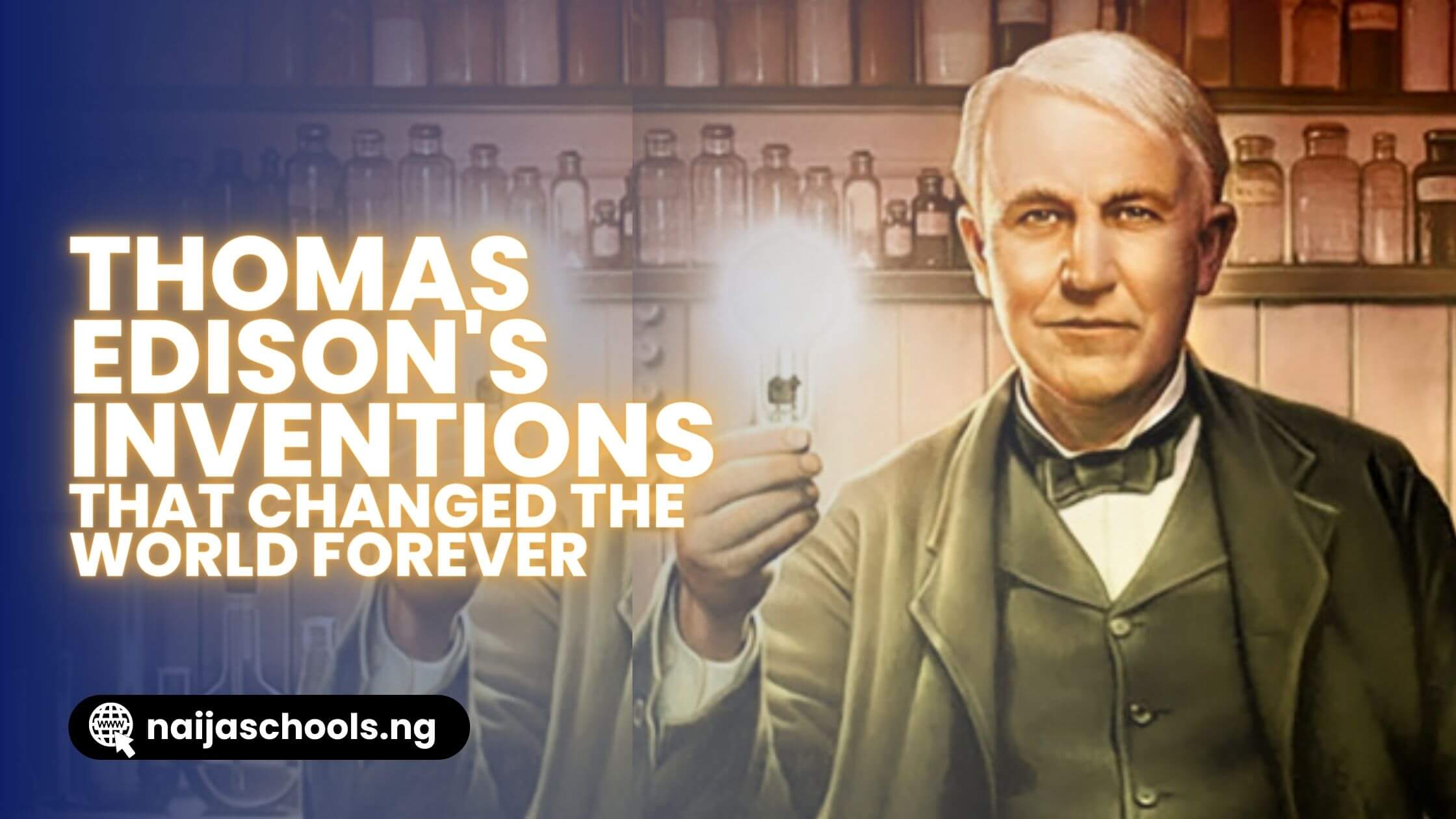As so often happens with geniuses, Thomas Edison didn’t fit into the system and was made aware of it when he was barely eight years old.
Thomas Edison’s early struggles in school were just the beginning of his journey toward becoming the most prolific inventor in history. After his mother, Nancy pulled him out of school and educated him at home, Edison began experimenting with science books he found at the library.
At the age of fifteen, he began working as a telegraph operator and invented his first device, an automatic repeater, a year later. However, Edison’s first patent was for an instrument for the mechanical counting of votes in 1868, which was not well-received by the Washington Congress.
Despite these setbacks, Edison continued to innovate and eventually established an invention factory in Menlo Park, New Jersey in 1876. Over the course of the next decade, he accumulated over 400 patents.
Today, Thomas Edison is widely regarded as one of the greatest inventors of all time. Through his many groundbreaking inventions and innovations, he transformed the way we live and work, leaving a lasting legacy that continues to shape our world today.
In this article, we’ll take a look at 10 of Edison’s most significant inventions and the impact they had on the world.
1. Phonograph
Edison’s invention of the phonograph in 1877 was a game-changer for the music industry and entertainment. The phonograph was the first device capable of recording and reproducing sounds, paving the way for the creation of new musical genres and a whole new form of artistic expression.
2. The Incandescent Light Bulb
The light bulb is perhaps the most popular invention Edisson is known for. It revolutionalized the way we light our homes and workplaces. Imagine the hazard if the world still relied on candles and gas lamps for illumination. Edison’s invention of the incandescent light bulb in 1879 not only made our lives easier and safer but also opened up new opportunities for productivity and economic growth.
3. The Kinetograph
Through the invention of the Kinetograph, a motion picture camera in 1891, it was possible to capture and project moving images. This created a new industry and paved the way for the creation of movies, television, and video games.
4. Nickel iron batteries
Edison designed nickel-iron rechargeable batteries, made up of two electrodes submerged in an alkaline solution. They were a cheaper and safer alternative to acid and lead. He created them with the idea of powering electric cars for what he considered to be the vehicles of the future. As evident today with the proliferation of electric cars like Tesla, Edison was ahead of his time.
5. Carbon microphone
Another significant invention of Thomas Edison was the Carbon microphone in 1877. This invention forever transformed the communication technology industry. The microphone was relatively cheap, more sensitive, and reliable than previous designs, making it possible to transmit clearer and more accurate sound over long distances. It was used in telephone speakers and microphones for over a century.
6. The Electric Vote Recorder
The electric vote recorder was Edison’s first patented invention in 1869. The invention had a significant impact on democracy and political systems. The recorder made it possible to tally votes quickly and accurately, making elections more transparent and democratic.
7. The quadruplex telegraph
The telegraph emits and receives signals according to an electrical impulse code. The quadruplex, created in 1874, had the particularity of allowing four telegraph messages to be sent and received simultaneously.
8. Mimeograph
The device, patented in 1887, allows a large number of copies to be made on stencil paper. It was first used by Albert Blake Dick, who was licensed by Edison to produce another invention based on this equipment.
9. Electricity distribution system
On September 4, 1882, Edison invented the world’s first electrical distribution system. The system supplied 110 volts of direct current to 85 users on Pearl Street in Manhattan, New York. He got a patent for the invention in 1887.
10. Dictaphone
The device was used to record audio and was used mainly to capture speech that later had to be transcribed. The Dictaphone was a trademark registered by the Columbia Graphophone Company in 1907, which is why the inventor marketed the product under the name Ediphone.
Conclusion
Through his many inventions and innovations, Thomas Edison changed the world forever. His contributions to science, technology, and culture continue to influence our lives today, paving the way for new ideas and opportunities. As we look to the future, we can only imagine what other game-changing inventions and innovations Edison’s legacy will inspire.
Frequently Asked Questions:
What was Thomas Edison’s first invention?
Thomas Edison’s first invention was the electric vote recorder, which he patented in 1869. However, it was not successful commercially.
What was the impact of Edison’s invention of the phonograph?
The phonograph revolutionized the music industry and allowed for the mass production of recorded music. It also paved the way for other sound recording technologies.
How did Edison’s invention of the light bulb change society?
The invention of the light bulb made electricity more practical and accessible for everyday use, transforming homes, businesses, and cities around the world.
What was Edison’s role in the development of the motion picture industry?
Edison played a major role in the early development of motion picture technology, patenting the first motion picture camera and working to create a system for projecting films in theatres.
How did Edison’s inventions impact communication technology?
Edison’s inventions, including the telephone transmitter and carbon microphone, helped improve communication technology by allowing for clearer and more reliable transmission of sound over long distances.
What was Edison’s approach to invention and innovation?
Edison was a prolific inventor who believed in the importance of experimentation and trial and error. He famously said, “I have not failed. I’ve just found 10,000 ways that won’t work.”
Did Thomas Edison invent the light bulb?
While Edison did not invent the first light bulb, he did develop the first practical, long-lasting incandescent light bulb. Edison’s improvements to the design of the light bulb made it more commercially viable and helped make electricity a more practical source of lighting.
What was Edison’s relationship with Nikola Tesla?
Edison and Tesla were both brilliant inventors and pioneers in the field of electrical engineering. However, their approaches to innovation were very different, and they often clashed over their differing opinions. Edison was known to be critical of Tesla’s work, and the two had a long-standing rivalry.
What other industries did Edison’s inventions impact?
In addition to his work in communication technology, Edison’s inventions also impacted a wide range of other industries. For example, his improvements to the storage battery made electric cars and other types of transportation possible, while his work on cement production helped make modern construction methods possible.
How did Edison’s inventions impact the economy?
Edison’s inventions and innovations helped drive economic growth and development in many industries. His work helped create new jobs and industries, and his improvements to existing technologies helped make them more practical and efficient, improving productivity and lowering costs.
What was Edison’s legacy as an inventor?
Edison is widely regarded as one of the most important inventors in history, and his contributions to science and technology have had a lasting impact on the world. His legacy includes his numerous inventions and his innovative approach to research and development, which helped establish the modern research and development process.
What are Edison’s 3 most famous inventions?
Edison’s three most famous inventions are the phonograph, the incandescent light bulb, and the motion picture camera.
What are 5 things that Thomas Edison invented?
Thomas Edison invented many things throughout his career, but five of his most notable inventions include the phonograph, the incandescent light bulb, the motion picture camera, the alkaline storage battery, and the carbon microphone.
How many things did Thomas Edison invent?
Thomas Edison is credited with inventing over 1,000 things throughout his career, including many groundbreaking technologies and innovations.
How did Thomas Edison change the world?
Thomas Edison’s inventions and innovations helped transform many industries and improve people’s lives. His work in communication technology, transportation, and energy production helped drive economic growth and development, while his contributions to motion picture technology helped create a new form of entertainment and artistic expression.
How did Thomas Edison become famous?
Thomas Edison became famous for his invention of the phonograph in 1877, which helped establish him as one of the most prominent inventors of his time. He continued to innovate and make significant contributions to science and technology throughout his career, solidifying his place in history as one of the most important inventors of all time.








Thank you very much for this!
I learned a lot.